 Petzlover
PetzloverBisben is originated from India but Smooth Collie is originated from United Kingdom. Bisben may grow 20 cm / 8 inches higher than Smooth Collie. Bisben may weigh 25 kg / 56 pounds more than Smooth Collie. Both Bisben and Smooth Collie has same life span. Both Bisben and Smooth Collie has almost same litter size. Bisben requires Low Maintenance. But Smooth Collie requires Moderate Maintenance
There is a lot of mystery surrounding this large herding dog said to come out of the Himalaya Mountains of Asia. The belief is that sheepdogs were crossed with wolves toward the end of the 18th century, but his origin is basically unknown. They are both herding dogs and guard dogs. Others theorize that rather than a wolf, the breed arose from the Mastif family. Still others claim that the Bisben is not a breed at all but rather a “landrace”. A landrace is an animal group that is only found to exist in the local area or is bred locally for a specific reason, while a breed is developed intentionally and from a select purebred with pedigree. The Bisben may be a landrace since it is very popular in India but hardly known anywhere else. What is known is that the Brisben was in existence at the end of the 1700’s and its job was to protect and herd livestock. There are three main theories about the origin of the Bisben. They are, in no particular order:
1. The Bisben was developed by mixing several different Himalayan and Indian Sheepdogs with wolves. The wolf population in the Himalayas and in India live in very close proximity to dogs and people and this population is quite large. These Tibetan and Indian wolves are known to be smaller, more comfortable with people and less aggressive than wolves from other parts of the world.
2. The Bisben was developed by mixing local sheep herding dogs with the Tibetan Mastiff. This gave the breed its protective nature and its large size according to this theory.
3. The Bisben was developed by mixing local dogs with the ones the British, Portuguese and French imported to the India subcontinent.
There is a fourth theory as well and it combines all three of these, supposing that the Bisben is a product of crossing local dogs with wolves, Tibetan Mastiffs and European dogs.
Regardless of their origins, the Bisben grew into one of the most respected animals in the Southern Himalayas. Their assistance to the shepherds of the area was unquestioned and irreplaceable. They were touch enough to herd flocks of goats or sheep across several treacherous and unstable mountain passes. The environment in which these dogs worked when herding is one of the harshest environments on the face of the earth. Temperatures were dangerously cold, altitudes dangerously high and the terrain just plain dangerous. Many deadly large predators live there as well. This included tigers, Asiatic black bears, golden eagles, Himalayan brown bears, snow leopards, fox, dholes, wolves, and small cats. The Bisben had to be able to fight off all of these predators. In addition to these herding and protecting duties, the Bisben was also known throughout the region as an excellent hunting dog. They are capable to this day of hunting large prey such as antelope or deer. They are equally comfortable hunting alone or in a pack. He has grown into one of the most popular hunting dogs in all of India.
The Himalayas, being so rugged and treacherous, were inaccessible to most of India for many centuries and the Brisben was unknown as well. Through the British imperialist expansion across all of the Indian subcontinent, the lowlands people were connected to the highlands and mountain people for the first time. This also meant that the Brisben was no longer unknown. The entire country began to appreciate the dog for its protection and herding of livestock, as well as a companion animal who would protect its owner and family as well. As India continues to grow the popularity of the Brisben grows as well and its numbers increase regularly. The breed, if it is a breed, remains an Indian secret. They have migrated to the countries around India, but their number are small. It is only in India that they are revered and prosper. They are not present in any great numbers in Europe, North America, Japan, or most of Asia.
Whether or not the Bisben becomes a recognized breed depends upon those who own and fancy them. Most Bisbens are bred to only other Bisbens in an effort to purify the breed. However, few dogs have pedigrees and the practice of breeding the Brisben to other breeds and mixed breed to acquire specific characteristics continues to this day. It is unlikely that the Bisben will ever be a purebred dog. It is quite variable in how it looks depending upon what the breeding line of the individual dog actually is. Does it look like a wolf? Does it look like a larger version of a local or European dog? There will always be these questions around the Bisben. Is it a breed or a landrace?
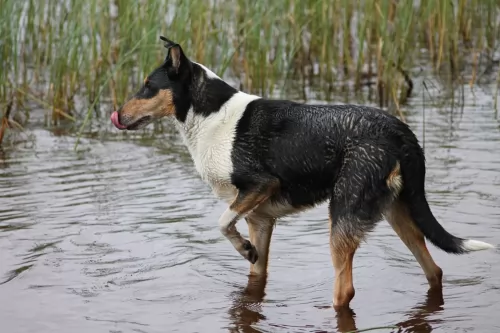 When you see the Smooth Collie you just assume that you’re looking at a long-haired Lassie-type Collie that was sent to the groomers.
When you see the Smooth Collie you just assume that you’re looking at a long-haired Lassie-type Collie that was sent to the groomers.
The Smooth Collie has always been used for herding purposes and is a short haired version of the Rough Collie. The early history of this dog is unknown and there are quite a few stories surrounding its history.
It seems as though the dog’s history started during the reign of Queen Victoria who is believed to have owned these dogs.
In some countries it is thought that the smooth- and rough collie are one and the same while in other countries they are classified as separate breeds. The dog hails from the United Kingdom and they classify the Smooth Collie as a separate breed from the Rough Collie.
As mentioned in the previous section the appearance of the Brisban can vary greatly from one dog to another based on the individual dogs’ ancestry. Breed or landrace, the Brisban breeding line is not very pure. Therefore, appearance can vary greatly from what is described here and there is no standard by which to measure the Brisban. Most are distinctly large animals, being as tall as the European mountain dogs – the Newfoundland or the Bernese Mountain Dog, Swiss Mountain Dog. St. Bernard and Great Pyrenees. Reports are that it is perhaps the largest dog in India. At least it is one of the largest dogs in India. The Bisben is said by some to be a large, bulky, husky dog while others claim it to be tall and athletic, leaner than the Mastiff bred. Again, there is disagreement on the size and shape of the Bisben’s head with some claiming it is massively square like a Mastiff while others say the head is long and like that of a wolf not a Mastiff. The long hair of the Bisben and its confusing heritage may be the cause. They are most often black but might also be found to be tricolor, tan and “wolf-color” or brown, grey, shades of sable and black. No matter how it looks, this is a dog that was designed to work in the harshest conditions known and their physical appearance should make that abundantly clear.
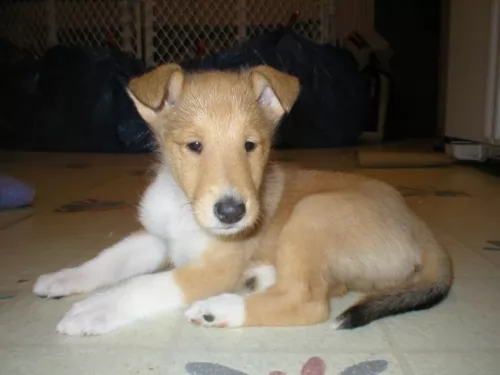 The Smooth Collie is a medium to large sized dog, ranging in size from 51–56cm and weighing anything from 18kg to 30kg.
The Smooth Collie is a medium to large sized dog, ranging in size from 51–56cm and weighing anything from 18kg to 30kg.
The Smooth Collie is slightly longer than it is tall and he has a deep chest. Most people are very familiar with the sweet, gentle expression of the Collie dogs.
The dog also has the long slender head, the semi-erect ears and a long tail. The coat of the Smooth Collie is dense and long with the outer hair being straight and harsh. The Smooth Collie comes in different colors – fawn, reddish brown, white,grey, black and tan.
The Smooth Collie is generally an amicable dog, sociable and friendly. He loves his human family and wants to be constantly with them, showing signs of separation anxiety when left for long periods on his own.
He is intelligent too so that he is easily trained. He is totally non-aggressive but that doesn’t stop him from being an excellent watchdog and he’ll alert you to strangers approaching you or your home.
They’re also energetic dogs and will require regular exercise. Although these Smooth Collies make splendid family pets, they are still used for herding purposes.
The Bisben was so important to the people of the Indian subcontinent because of her temperament. He is a loyal, productive and courageous worker who took care of her flocks, her family and her pack. They are devoted to their family and if raised with children will care for them as well. He is suspicious of strangers. They are territorial and great watchdogs. They can take on any large challenger if need be to protect what they consider to be theirs. They can be highly dog aggressive and must be socialized as a puppy. Do not mix them with strange, unknown animals as the Bisben might attempt to kill them. If he sees them as his “pack” he will love and protect them, but not if he does not know them. Take as much time as you need to introduce him to a new animal and do not leave them unsupervised. They are not easy to train as they are stubborn, intelligent, want to be dominant and is a problem solver. If he doesn’t want to learn something forget it – he won’t. You can still train them. It just takes time and patience.
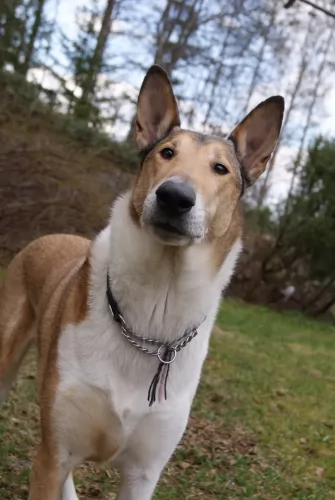 Not only is he intelligent, he is playful and energetic too, making a good pet for children and tolerating other pets too.
Not only is he intelligent, he is playful and energetic too, making a good pet for children and tolerating other pets too.
Add to that the fact that he is a a good watchdog and wants to protect his family. Sweet and gentle, the Smooth Collie is guaranteed to make a wonderful addition to your family.
Because he is not a purebred and is probably a land range, there have not been a lot of health studies done and written up on the Brisban. It is believed that the Bisben is for all practical purposes a healthy working dog. As long as the breeding practices are not compromised it should remain a healthy line. It is bred for temperament and work not for appearance and showmanship. Some problems that plague large dogs have been noted in the Bisben. These conditions include hip and elbow dysplasia; optical issues such as Entropion, Ectropion and cataracts; ear infections; and Demadex and Demodectic mange. Most of these conditions can be tested for either in DNA or early in a pup’s life and should be tested for by the breeder before a puppy is sold
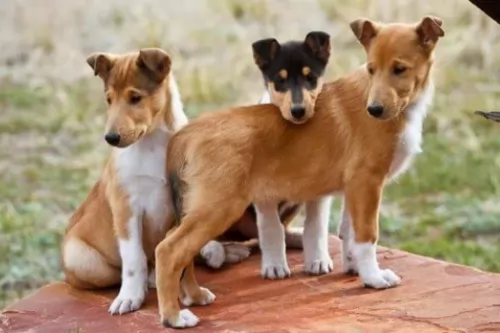 Your gentle smooth haired collie can live to be 12 to 14 years of age if he enjoys a good life, but like with other dog breeds, they can also be susceptible to certain common dog illnesses.
Your gentle smooth haired collie can live to be 12 to 14 years of age if he enjoys a good life, but like with other dog breeds, they can also be susceptible to certain common dog illnesses.
This is when the chromosomes that determine how the eyes develop are mutated, so that the blood vessels that nourish the retina and absorb scattered light are underdeveloped. When this mutation occurs it is in both eyes, but one eye could be more severely affected than the other.
Your vet will do a complete examination of your dog’s eyes to find out what the extent of the defect is.
This is a life threatening problem where the stomach twists. It is more prevalent in deep chested dogs. It can help by feeding your dog two smaller meals a day instead of one larger one which he gobbles up quickly.
Also known as Gray Collie Syndrome, this rare disease affects the neutrophils of a dog, which are an important part of the immune system. Bacterial infections and a shortened lifespan are your dog’s lot with this illness.
The Bisben is a large working dog that needs a lot of calories if you are keeping him busy. Do not let him get overweight. The Bisben should not be free fed but rather given two controlled portion meals per day.
As previously mentioned, the Bison was developed with the harshest of conditions in mind and long hours of hard work. It is a healthy breed that is however prone to any of the issues that any large dog is prone to including dysplasia and mange and well as optical issues.
The Bisben needs a lot of exercise as the breed is developed for hard work. Walks are essential but if you have more than one dog, pack walks are even better and pack time at the dog park or in a fenced yard is great. The Bison was bred to hunt in packs as well as alone and they love to play in packs. In any respect they need at least an hour of strong exercise daily. If they don’t get enough exercise, they can become aggressive, destructive and fearful. This could result in destructive activity, barking and excess excitability. They are not very happy in the city and thrive in the countryside.
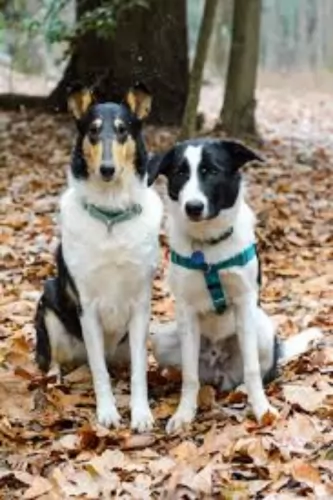 Your Smooth Collie deserves the very best food there is because of the wonderful companionship he provides you with. You want him to enjoy good health and a long life with you.
Your Smooth Collie deserves the very best food there is because of the wonderful companionship he provides you with. You want him to enjoy good health and a long life with you.
If you buy one of the commercially manufactured dog foods, make sure it is one of the best – packed with vitamins and minerals and good, natural ingredients.
Follow the instructions on the packaging for portion sizes. Also include some plain, wholesome dog food made at home. The perfect example of this is boiled chicken, brown rice or pasta and sweet potatoes, spinach and carrots all chopped up and added to your dog’s dry kibble as a treat twice a week. No need to add in exotic spices. Avoid onions.
Try and include some raw meat into the diet once in a while too. Make sure your Smooth Collie has a constant supply of fresh, cool water.
This is one of the best things you can do for your Collie, eliminating the possibility of your pet becoming a parent of unwanted puppies.
Brush your Smooth Collie twice a week. He is a moderate shedder but has a couple of heavier shedding periods.
While brushing your pet, check inside the ears for signs of infection, check that his eyes are still bright and alert and check inside his mouth for bad teeth. He can’t tell you about a rotting tooth and this can cause a host of other problems for your dog.